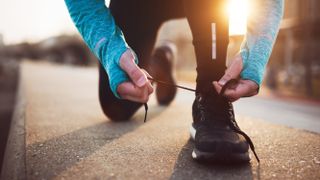
Your usual workout routine might no longer be possible if you're working from home and avoiding social contact, but regular exercise is still important for both your physical and mental wellbeing. Thankfully there are still lots of ways to get a good workout, even if you're self-isolating.
Strava has collaborated with running coach and medical doctor Dr Megan Roche to create a guide to being active during the Covid-19 crisis.
“Exercise can help manage stress, boost the immune system, and improve energy levels," says Dr Roche, who is a champion trail runner and and epidemiology researcher.
However, you might need to make some changes to your usual routine. It all comes down to density, and making sure you keep an appropriate distance from other people.
Keep a safe distance
Many sports governing bodies around the world now recommend avoiding club activities and training sessions – even if they don't involve physical contact with other athletes, coaches or instructors.
"We are advising that clubs and groups should not be undertaking training, competitive or other related activities during this period, and it is already apparent that parts of the sport are already showing their own leadership and are acting in this respect," UK Athletics said in a statement.
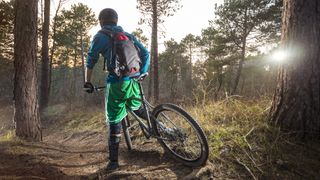
It's still possible to exercise outdoors if you can get away from the crowds, though. "If it will be easy for you to avoid other people (a minimum of six feet apart) during your run or ride and there aren’t restrictions on your outdoor movements in place or a quarantine, then it’s generally safe to exercise outdoors," says Dr Roche.
Get daily insight, inspiration and deals in your inbox
Get the hottest deals available in your inbox plus news, reviews, opinion, analysis and more from the TechRadar team.
"For example, if your community backs up to a forest, rural or mountainous area and there’s plenty of room to roam, then exercise as usual and give any passersby a wide berth."
If you live in a busy city and can't work out without bumping into others, home workout apps are a good option. Some are designed to work with a treadmill or exercise bike, but there are also lots of workouts that can be completed with weights, resistance bands, a yoga mat, or no equipment at all.
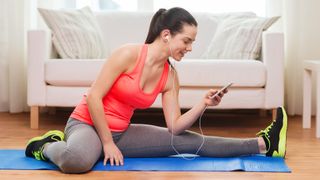
The best home fitness apps feature workouts devised by professional instructors, and presented as clear videos that you can watch on your mobile device or cast to your TV for easier watching.
The great outdoors
If you're lucky enough to have somewhere quiet to run, walk or cycle alone, a fitness app like Strava, Garmin Connect or Runkeeper will let you log your activities, stay motivated with challenges, and keep in touch with your regular workout buddies or club.
You can record your activity with your phone, but a smartwatch or dedicated fitness tracker will give you a lot more information, including your heart rate, estimated VO2 max, in addition to GPS tracking. Some even let you listen to music without carrying your phone.
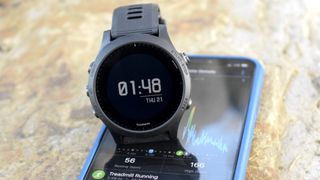
Working out solo can be lonely, particularly if you usually head out with a group, so it's also worth investing in a pair of good running headphones so you can enjoy your favorite feel-good music or podcasts on the move.
The best running headphones provide a snug fit, so you can run without worrying about them coming loose or bouncing, and some even have a built-in heart rate monitor.
If you're going to be crossing roads, it's worth considering a pair of open-ear headphones like the AfterShokz Trekz Air, which use bone conduction to carry sound and leave your ears free so you can hear your surroundings.
Don't overdo it
While it's good to keep moving, Dr Roche advises against overdoing frequency or intensity of workouts to avoid putting your body under unnecessary stress.
"Overtraining and/or rapid increases in training volume can burden the immune system," she said. "It’s also important to listen to any symptoms that may arise. Typically, I suggest that athletes with mild cold symptoms back off intensity and duration of exercise.
"In our current situation, in the event of any symptoms, I suggest that athletes be more cautious, rest, and consult with their physician.”
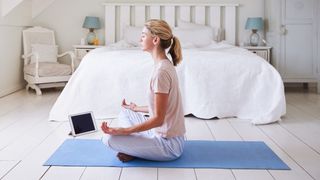
If you want a gentle workout, there are lots of excellent workout apps that focus on yoga and pilates rather than strength and endurance exercises. Asana Rebel, for example, features workouts for all abilities, plus guided meditation sessions and breathing exercises to help you sleep better.
“Across the world right now, we are almost all experiencing varying levels of fear, anxiety, and foundational shifts in our daily routines,” says Dr Roche. “It’s unprecedented. But it’s also a remarkable opportunity to support each other in our shared experiences. Think about it as practicing physical distancing as opposed to social distancing – be extra engaged when you can
"Call your running friends, give extra Strava kudos, support local businesses online, or tell someone you care about them. Every little action makes a difference as a collective athletic community.”
- The best fitness tracker 2020: the top 10 activity bands on the planet
Cat is the editor of TechRadar's sister site Advnture. She’s a UK Athletics qualified run leader, and in her spare time enjoys nothing more than lacing up her shoes and hitting the roads and trails (the muddier, the better)
Most Popular



